FOTE14: Evenly Distributing the Future
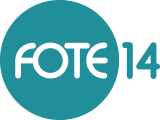 Last week I returned for my second visit to the ULCC event Future of Technology in Education held at Senate House, University of London. (Here are my notes from last year).
Last week I returned for my second visit to the ULCC event Future of Technology in Education held at Senate House, University of London. (Here are my notes from last year).
The annual event is aimed at those in the UK interested in technology use in learning from HE, FE, public and the commercial sector.
In lieu of Ada Lovelace day (falling on 14 October) the one-day event began with a number of sessions dedicated to exploring the gender gap in technology. As our hosts pointed out: only 30% of the attendees at FOTE were female, so it seemed pertinent to ask why.
Samantha Swift, Product Manager, McAfee Labs began by looking at Promoting positive role models to bridge the technology gender gap. Recent research at McAfee Labs has involved getting people to recognise familiar faces in technology. The men (Bill Gates, Mark Zuckenburg, Steve Jobs etc.) were more recognisable than the women (Martha-Lane- Fox, Susan etc.), this is maybe unsurprising but the low levels of female recognition were fairly extreme – 73% of those alsed said they had not heard of any high-ranking women in the field of technology. Efforts are being made by McAfee to promote positive role models to bridge the technology gender gap’; as Samantha Swift explained it’s ‘not just what I want to be when I grow up, but who I want to be like’.
The Women in Technology Panel featuring Heidi Fraser-Krauss, Head of IT Services and Deputy Director of Information, University of York; Mandy Phillips, Head of Corporate Business Change Initiatives, Liverpool John Moores University; Samantha Swift, Product Manager, McAfee Labs and chaired by: Sarah Sherman, BLE Service Manager, The Bloomsbury Colleges met with a mixed response.
As one tweet put it:
Agree that we need to stop talking about the #womenintech issue and just get on with it. No more panels please! #fote14
— Sinead Mac Manus (@sineadmacmanus) October 3, 2014
The panel was looking at two separate, but related, issues: getting females interested in technology as a career and supporting females in management roles in technology. While there was recognition of the problem – Gartner research stats for leadership roles show only 11.2% in Europe are women in the UK whereas US is 18.1% – many felt that the root causes lie deeper and beyond IT. During the discussions it was noted that there are more women in e-learning than IT, possibly because e-learning is newer / more niche field with fewer stereotypes engrained within. Issues include: lack of media attention and unequal hiring policies, a patriarchal society, womens’ domestic situation etc. There did seem to be consensus by the audience that a more positive move would be to hear women talking about the future of technology than about gender.
After the coffee break we moved to more traditional territory with Dave Coplin, Chief Envisioning Officer, Microsoft, speculating on the future of education – albeit in a Microsoft kind of way. Dave explained that his area of interest is how human beings will used technology, or the future of humanity! This future is firstly uncertain and we need people who can deal with that uncertainty, and secondly starts with education, which currently doesn’t adequately prepare people. Dave mentioned some issues around ‘snacking on information’ and ‘infograzing’ that may need to change our approaches. There were hat tips to more than a few Microsoft innovations: Bing, Project Spark, Minecraft (recently acquired by Microsoft) and a future Skype language software which will be able to do simultaneous real time translation in a babel fish technology type way!
In my favourite talk of the day Bethany Koby, CEO from Technology Will Save Us asked in a tongue-in-cheek way – “Will Technology Save Us?”. The tech company have some refreshing ideas that support active learning and are rooted in the maker culture: DIY gadgets, kits that promote creative building and problem solving activities. It all sounded like a great way of engaging kids in learning and critical thinking and was a nice supporting piece to questions around STEM motivation for young people. It is clear that maker spaces are a big part of future education With kits encourage the blended learning process – physical making but also online learning/resources. At last an approach that moves away from tech snobbery and esoteric attitudes!
In a talk that involved a fair amount of passion and probably too much swearing Miles Metcalfe, an independent contractor, suggested ways for us to co-create the future. He pointed out that the current Google Model is very similar to the origins of radio and TV broadcasting in the USA. We need to push for a more distributed approach. He argued that one reason for the success of tools like the iPhone is that they have allowed people to co-create ultimately re-invented how technology is used. Metcalf pointed out how the drive to get everyone to code is “like the STEM shortage” – we don’t all need to code but we do need to be digitally literate.
The Future Gazers Panel consisted of the previous speakers and was chaired by Frank Steiner, Marketing Manager, ULCC. One interesting observation by an audience members was that it seems that “companies make lots of money, then give some money away to solve problems, problems they created in making their money“.
This offered some food for thought for the post-lunch learning technology dragon’s den: Pitchfest.The technology startups were:
- Evaloop – Improving the teaching and learning experience in any educational environment by making feedback and survey data collection continuous and timely.
- Fluency – Offering an alternative education system for learners focused on vocational skills and just-in-time learning.
-
keywordsenglish – A language and literacy app.
simplifying academic English for secondary school biology. - Knodium – Seamlessly bridging the gap between the real learning environment and the virtual one.
- linguaflow – Spanish Classes online, Spanish language videos, podcast, mp3, ebook.
- Pod academy – Platform for free podcasts on academic research
- Reframed – Creates contextual conversations with time-specific comments in video, shares them with deep links, follows users and favourite comments.
- Mobile Collective – Brings together people for hack days.
- MTCQs – Creating and sharing multiple choice questions.
The late afternoon session involved some great use of the parody copyright exception which came in to force on 1st October 2014 as James Clay, Group Director of IT, Activate Learning (previously ILT & Learning Resources Manager at Gloucestershire College) offered us his IT services parody on star wars. James began with a potted history of his relationship with IT services aka “the dark side”. With his recent new found understanding from the other side of the fence James explained that quite often IT services say “no” when they mean “don’t know”. And while e-Learning people often see IT Services as blockers of innovative yet many are often ignorant about large scale implementation of technology, IT services see e-learning people as blinded by gadgets and tech toys. James concluded that it is not about one side or the other ‘winning’, it’s about compromise and collaboration.
In a session on Securing Academic Cyberspace Keith Martin, Director, Information Security Group, Royal Holloway asked us if anyone currently cared about cyber security issues. He then shared a plethora of recent stories of cyber security attacks from the BBC website including tales of Heartbleed, Maryland University customer accounts hacked, and other cybercrime. Keith explained that cyber security includes dealing with data traces and “data that is lying around on the internet“, all topic areas that we should be increasingly aware of.
One or two people have to get eaten by lions before you realise they aren't as cuddly as they look? #fote14
— Domi Sinclair (@Lilly_Stardust) October 3, 2014
In the final talk of the day Steve Wheeler, Associate Professor, Plymouth University warned us that digital learning futures need to ‘Mind the Gap’! Steve took us through a series of fun anecdotes and pointed some of the fundamental mistakes we are making related to the ‘distances’ between people: age; gender, digital literacy, etc. So when we mediate the conversation with technology often we choose the wrong approach and make the gap larger. As Steve explained, the problem is that we are often in awe of new technology: “any sufficiently advanced technology is indistinguishable from Magic“: Arthur C Clarke. Steve ended with another quote “The future is already here – it’s just not evenly distributed” – so true.
Senate Secrets
One of the great new activities at this year’s FOTE was the Senate Secrets Challenge. This was a collaborative treasure hunt that took place online and offline before and during the conference. Their idea was that delegates could work together to unlock the six padlocks on the Senate Chest revealing ‘fabulous prizes’. The game was not only fun but a great way to get delegates talking to each other and working together. Katie Piatt has created a Storify of the challenge journey.
Challenge 1 was solved so quickly there were a lot of disappointed clue hunters BE FAST! #senatesecrets #FOTE14 pic.twitter.com/zUSsHUqDsF
— FOTE a ULCC event (@FOTiE) October 3, 2014
This year there were efforts to include a remote audience (read the FOTE case study from Event amplifier) through live streaming and a Google Hangout for remote attendees.
 Open Education Working Group
Open Education Working Group 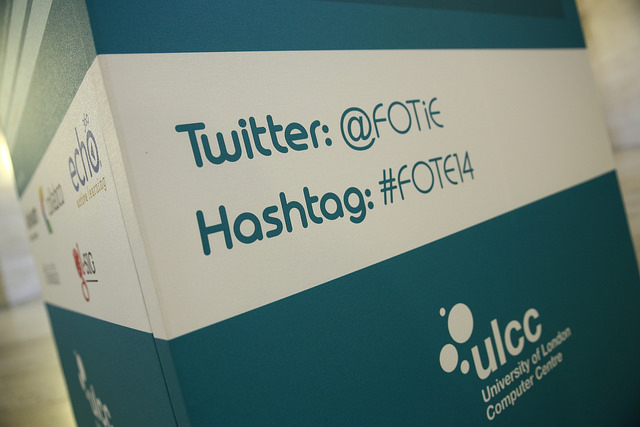
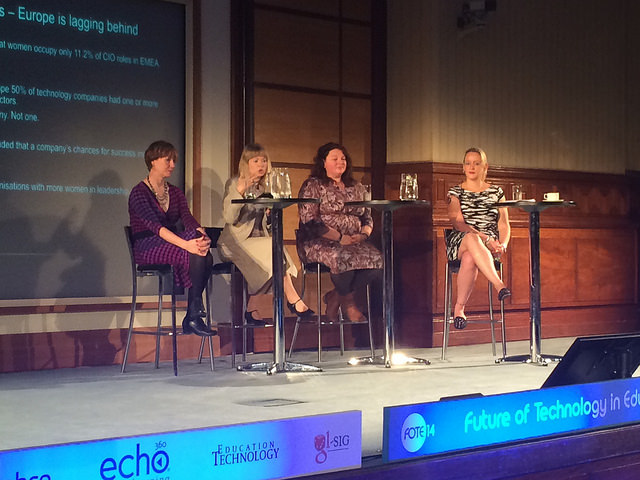
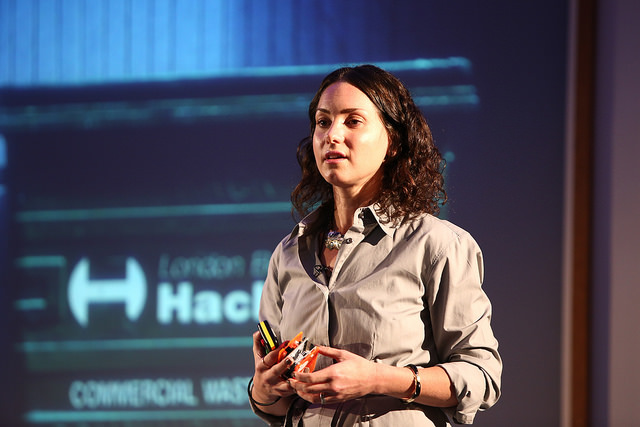
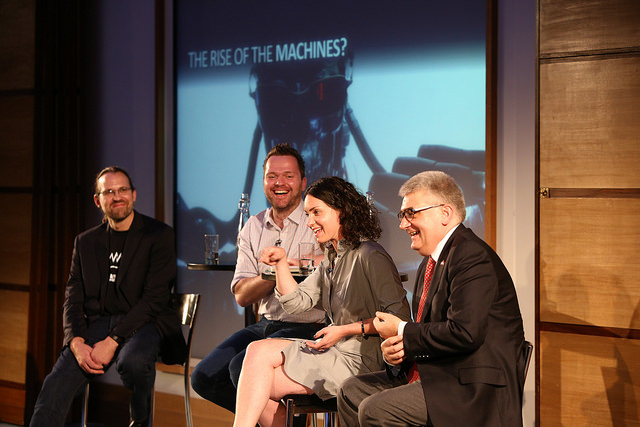
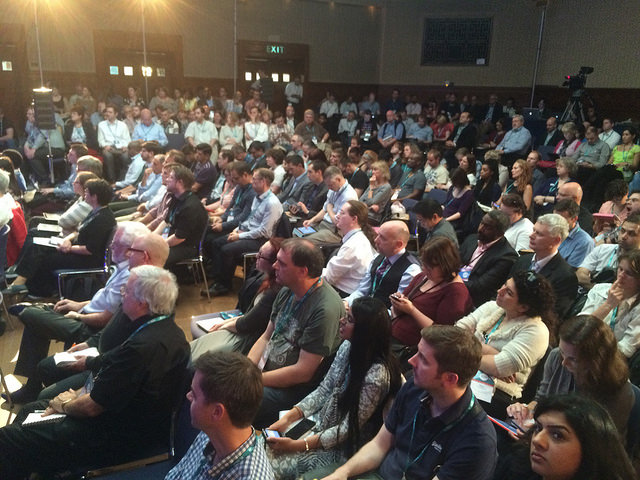




Leave a Reply